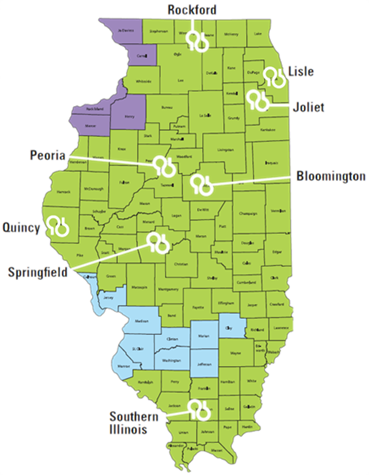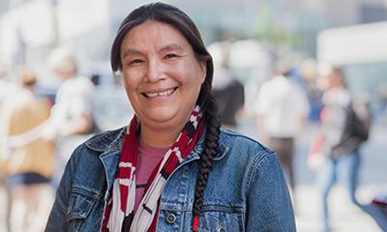The land on which the Alzheimer’s Association Illinois Chapter works and serves the community includes the traditional homelands of the Menominee, Ho-Chunk, Peoria, Kaskaskia, Piankashaw, Wea, Miami, Mascoutin, Sauk, Mesquaki, Winnebago, Fox, Kickapoo, the Chickasha Nations and the Council of the Three  Fires: the Ojibwe, Potawatomi, and Odawa. By acknowledging the land, we recognize that it holds significance for its original stewards: the Native Nations and peoples of the region.
Fires: the Ojibwe, Potawatomi, and Odawa. By acknowledging the land, we recognize that it holds significance for its original stewards: the Native Nations and peoples of the region.
These lands were the traditional birthright of indigenous peoples who were forcibly removed and who have faced two centuries of struggle for survival and identity in the wake of dispossession. We acknowledge the ground on which we stand so that all who work and partner with us know that we recognize our responsibilities to the peoples of that land and that we strive to address that history so that it guides our work in the present and the future.
➖ ➖ ➖ ➖ ➖ ➖
Indigenous Communities & Alzheimer’s
In recognizing the land and its original stewards, the Alzheimer’s Association also recognizes the health disparities that our indigenous communities face. One in 5 indigenous adults aged 45 and older reports experiencing memory or thinking problems that might be a sign of dementia.
At the same time, indigenous peoples overall have less access to healthcare and health services and are less likely to be diagnosed once they show symptoms, creating unique challenges in addressing Alzheimer's and other dementias. In addition, Native American cultures hold great esteem for Elders and are more likely to take care of their Elders at home. This may create stress for caregivers.
- As many as 1 in 3 Native American Elders will develop Alzheimer's or some other form of dementia.
- Between 2020 and 2060, the number of American Indian/Alaska Native individuals aged 65 and older living with dementia is projected to increase four-fold.
- The vast majority (92%) of Native Americans say that it is important for Alzheimer’s and dementia care providers to understand their ethnic or racial background and experiences. However, only 49% of Native Americans say that they have access to culturally competent providers.
- 61% of Native Americans say that affordability of care is a barrier.
- More than one-fourth (27%) of Native American caregivers report being treated with less respect than others.
- Four in 10 (40%) of Native Americans believe that medical research is biased against people of color and only 65% believe that an Alzheimer's cure will be shared fairly, regardless of race, color or ethnicity.
|
For more information, please see the Association's Alzheimer's Disease Facts and Figures special report on Race, Ethnicity and Alzheimer's in America (PDF).
➖ ➖ ➖ ➖ ➖ ➖
Indigenous communities at risk
.png) The report Memory Loss and Alzheimer's Disease in Native People tells the stories of Native American Elders living with Alzheimer's and their caregivers and reiterates the importance of early detection.
The report Memory Loss and Alzheimer's Disease in Native People tells the stories of Native American Elders living with Alzheimer's and their caregivers and reiterates the importance of early detection.
Because indigenous peoples had considerably shorter lifespans than White Americans during the 19th and 20th centuries, Alzheimer's and other dementias were relatively rare. People aged 65 and older now comprise 15% of the overall indigenous population, compared to 4.8% in the 1970s. Some indigenous languages also do not have a word for "dementia." But now, as indigenous peoples' lifespans are more likely to reach the prime ages for the development of Alzheimer's and other dementias, awareness of Alzheimer's and its symptoms is lower compared to other populations.
Valerie Jones, a member of the Navajo Nation, describes her work first with the Navajo Department of Health and now with the Indian Health Service on education, data collection, and caregiver support for Alzheimer's and dementia. She emphasizes the need for culturally appropriate education and support and ensures that the community owns and takes pride in local resources.
If you are an organization that serves an indigenous community and are interested in finding out more about how to partner with the Alzheimer’s Association in serving your community by providing awareness, education, and resources, please reach out to Amelia Garza at amgarza@alz.org.
➖ ➖ ➖ ➖ ➖ ➖
Make a difference: Volunteer with the Alzheimer's Association
 Millions of Americans are impacted by Alzheimer’s disease, but you can do something to help by becoming an Alzheimer’s Association volunteer. Our ability to reach and support those affected depends on people like you who are dedicated to the fight against this disease.
Millions of Americans are impacted by Alzheimer’s disease, but you can do something to help by becoming an Alzheimer’s Association volunteer. Our ability to reach and support those affected depends on people like you who are dedicated to the fight against this disease.
As an Association volunteer, you can use your unique talents to make a meaningful impact in your community while connecting with others who share your passion. Read how Valerie Tsosie, Navajo, a community educator with the New Mexico chapter, works as a community educator to support Diné caregivers. Barbara Tinhorn, member of the Hualapai Tribe, has actively engaged her community in Alzheimer's education and started a bimonthly support group on the reservation.
Volunteer opportunities are available in care and support, research, advocacy, and fundraising events. Getting started is easy — sign up today at alz.org/volunteer.